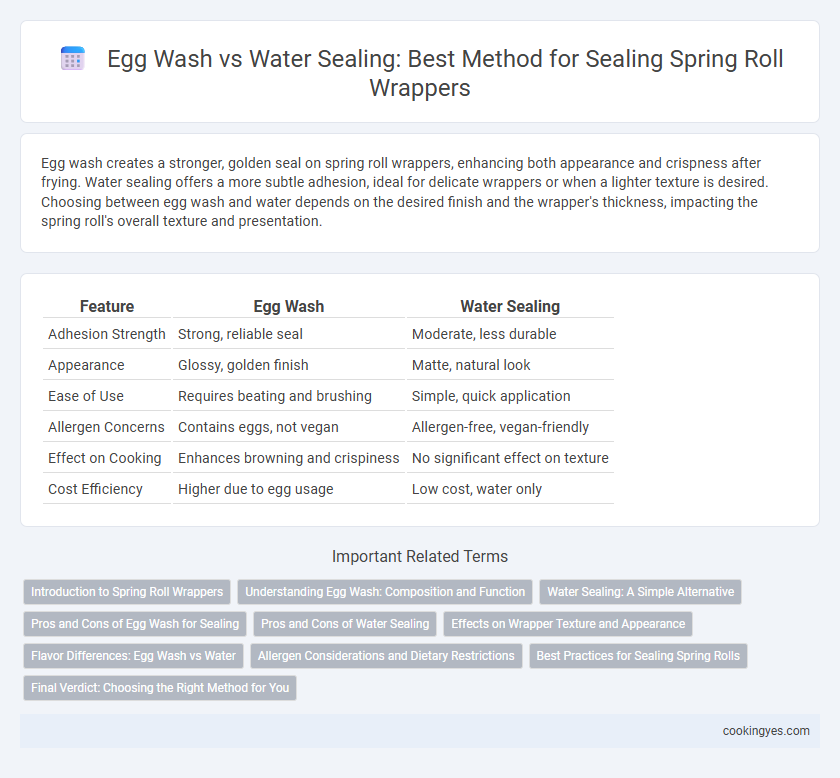Egg wash creates a stronger, golden seal on spring roll wrappers, enhancing both appearance and crispness after frying. Water sealing offers a more subtle adhesion, ideal for delicate wrappers or when a lighter texture is desired. Choosing between egg wash and water depends on the desired finish and the wrapper's thickness, impacting the spring roll's overall texture and presentation.
Table of Comparison
| Feature | Egg Wash | Water Sealing |
|---|---|---|
| Adhesion Strength | Strong, reliable seal | Moderate, less durable |
| Appearance | Glossy, golden finish | Matte, natural look |
| Ease of Use | Requires beating and brushing | Simple, quick application |
| Allergen Concerns | Contains eggs, not vegan | Allergen-free, vegan-friendly |
| Effect on Cooking | Enhances browning and crispiness | No significant effect on texture |
| Cost Efficiency | Higher due to egg usage | Low cost, water only |
Introduction to Spring Roll Wrappers
Spring roll wrappers are essential components made from rice flour or wheat flour that require proper sealing methods to ensure crisp texture and prevent filling leakage. Egg wash creates a stronger, more durable seal due to its protein content, enhancing the wrapper's ability to hold ingredients securely during frying or baking. Water sealing offers a lighter, more delicate bond suitable for delicate wrappers but may not provide the same level of adhesion or crispness as egg wash.
Understanding Egg Wash: Composition and Function
Egg wash, typically made from beaten eggs sometimes mixed with water or milk, acts as a natural adhesive and glaze for spring roll wrappers, enhancing their appearance and texture. Its protein content helps create a golden-brown finish during frying or baking while providing a stronger bond than water sealing alone. Understanding the composition of egg wash is essential for achieving crispy, well-sealed spring rolls without leaks.
Water Sealing: A Simple Alternative
Water sealing provides a simple and effective alternative to egg wash for spring roll wrappers by using water to moisten the edges, ensuring a secure seal during frying. This method reduces the risk of altering the flavor or texture of the wrapper, making it ideal for vegetarian or allergy-sensitive diets. Water sealing also offers a quick, mess-free option that maintains the crispiness and integrity of spring rolls.
Pros and Cons of Egg Wash for Sealing
Egg wash creates a stronger, more durable seal on spring roll wrappers, preventing filling leakage during frying and enhancing color with a golden, glossy finish. However, it can introduce extra moisture and potentially alter the flavor, which may not suit all fillings or dietary preferences. Water sealing offers a neutral taste and lighter texture but risks a weaker bond that might cause spring rolls to open or seep during cooking.
Pros and Cons of Water Sealing
Water sealing spring roll wrappers offers a simple, allergen-friendly alternative to egg wash, making it ideal for vegan or egg-free diets. It provides sufficient adhesion to keep the rolls intact during frying but may result in slightly less crispiness compared to egg wash. Water sealing can be less prone to browning unevenly, though it may not create as rich a golden color or strong seal, potentially leading to occasional unwrapping during cooking.
Effects on Wrapper Texture and Appearance
Egg wash creates a golden, glossy finish on spring roll wrappers, enhancing their visual appeal and contributing to a slightly crispier texture. Water sealing results in a more matte and softer wrapper surface, maintaining a delicate texture but with less browning. Choosing egg wash improves both the wrapper's color and crispness, while water sealing preserves a tender, pliable appearance.
Flavor Differences: Egg Wash vs Water
Egg wash imparts a richer, golden-brown color and a slightly savory flavor to spring roll wrappers, enhancing overall taste and appearance. Water sealing results in a more neutral wrapper flavor without added richness, allowing the filling's taste to remain prominent. Choosing egg wash boosts both flavor and presentation, while water maintains the wrapper's subtlety.
Allergen Considerations and Dietary Restrictions
Egg wash, commonly used for sealing spring roll wrappers, contains eggs, posing allergen risks for individuals with egg allergies and those adhering to vegan or egg-free diets. Water sealing is a hypoallergenic alternative, suitable for people with egg intolerance and various dietary restrictions, ensuring broader accessibility and safety. Choosing water over egg wash enhances the inclusivity of spring roll recipes in allergen-conscious and specialized dietary environments.
Best Practices for Sealing Spring Rolls
Egg wash creates a stronger, golden-brown seal on spring roll wrappers compared to water, enhancing both appearance and crunchiness during frying. Applying a thin layer of egg wash on the wrapper edges ensures a secure bond that prevents filling leakage and maintains the roll's shape. When egg wash is unavailable, using water can suffice, but it offers a weaker seal prone to opening during cooking.
Final Verdict: Choosing the Right Method for You
Egg wash creates a stronger, golden-brown seal on spring roll wrappers, enhancing both appearance and crispness, while water sealing offers a lighter, more neutral taste with sufficient adhesion. For delicate fillings or a softer texture, water is preferable, but for a robust, visually appealing crust, egg wash is ideal. Your choice depends on whether you prioritize texture and color or flavor neutrality in your spring rolls.
Egg wash vs water sealing for spring roll wrappers Infographic

 cookingyes.com
cookingyes.com